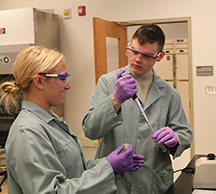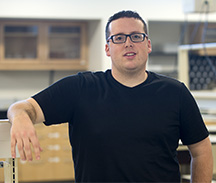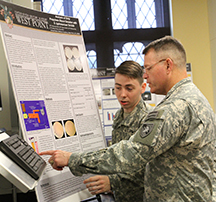Purdue-led STEM program offers West Point cadets authentic research opportunities
October 23, 2014
 |
|
Class of 2017 cadets Savannah Baker and Cole Ogrydziak experiment in the chemistry lab at West Point on gasification polisher mutagenicity. Cadet teams could choose to work on a chemical engineering, analytical chemistry or toxicology experiment through the partnership between the Purdue-led Center for Authentic Science Practice in Education (CASPiE) and the U.S. Military Academy. (Photo Courtesy of U.S. Military Academy Public Affairs) |
WEST LAFAYETTE, Ind. - West Point and West Lafayette have more in common these days.
Through a partnership between Purdue University and the U.S. Military Academy, 80 plebes and a dozen yearlings gained an authentic research experience in toxicology, analytical chemistry and chemical engineering.
The link for the freshman and sophomore West Point students was made possible through the Purdue-led Center for Authentic Science Practice in Education (CASPiE), a science, technology, engineering and mathematics (STEM) initiative led by the Discovery Learning Research Center in Discovery Park.
"The CASPiE-West Point project provided cutting-edge for first-year undergraduate chemistry students," said Lt. Col. Hailey Clancy, who served as one of the CASPiE instructors, advisers and evaluators. "This was an opportunity for them to think like scientists for the first time."
CASPiE, conceptualized by former DLRC director Gabriela Weaver and initially funded by a grant from the National Science Foundation, provides first- and second-year college students with access to authentic research experiences as part of the regular science curriculum. Early experiences of this type can enhance student interest and retention in STEM majors. CASPiE is part of the DLRC's portfolio of innovative STEM education research initiatives aimed at transforming undergraduate education to better meet the needs of 21st century students and employers.
The cadet teams entered the laboratories on April 10 to start, for the first time, the experiments they designed. Unlike the typical cookbook-style laboratory lessons the cadets are used to, CASPiE labs require students to design their own experiments and generate real research data.
"This is actual research they might not otherwise have experienced until graduate school," Clancy said. "We're evaluating their critical thinking skills, their creativity and their understanding of science so they will be better able to design an experiment."
 |
|
Anthony Chase |
That's where Anthony Chase comes in.
The Purdue chemistry graduate student spent the spring semester at West Point helping faculty members evaluate the impact of the CASPiE project on student-learning outcomes. Chase and Clancy conducted a joint presentation with the results of his dissertation in August during a national chemical education conference in Michigan.
"Our evaluation as a research project goes beyond simple measures of student learning," Chase said. "Everybody already knows cadets are smart and motivated.
"So what we're looking at are the abstract things like development of critical-thinking skills and scientific literacy. Our research shows that the CASPiE model is really engaging the plebes. They are diving into their labs because they're seeing a real research project far different from what they've had in typical labs."
These conclusions are based on an analysis of cadet interviews where they elaborate on what they've experienced from conducting lab research, and two critical-thinking tests taken before and during the project.
Early results from the West Point-Purdue CASPiE partnership confirm a positive impact of the model on critical-thinking skills.
 |
|
Class of 2017 Cadet Adam Kratch briefs the Dean of the Academic Board, Brig. Gen. Timothy Trainor, on his project. Kratch worked with Class of 2017 cadets Alexandra Bell and Minhee Pak on a project entitled "Analysis of Dirty Propylene Glycol Solution with s.typhimurium TA1535." The project was through a partnership between the Purdue-led Center for Authentic Science Practice in Education (CASPiE) and the U.S. Military Academy. (Photo Courtesy of U.S. Military Academy Public Affairs) |
In a scientific sampling of the West Point students in August 2013 and again last January, the CASPiE team saw a normative 1.28 percentage-point improvement in critical thinking. Taken again in May, the results were a significantly significant 3 percentage-point increase.
"The results were super exciting. This has been a terrific experience for me," Chase said.
So much so that Chase, who will finish his master's degree in chemistry this fall, plans to pursue a doctoral degree in educational psychology, continuing his studies at Purdue with the USMA and with professor Weaver, who is now associate provost for faculty development and director of the Center for Teaching and Faculty Development at the University of Massachusetts-Amherst.
Student interviews about the CASPiE experience indicate that the Purdue program also is accomplishing the goal of retaining students in STEM fields. Student feedback revealed a larger interest in STEM fields after participation than before the program.
"Getting to do such an in-depth experiment in our plebe year was beneficial, I think, because it helped me look at chemistry and life sciences as a whole, and I decided I probably want to major in life sciences," said Carly Katalinic, a Class of 2017 West Point cadet.
Her classmate Lars Robinson had prior research experience in high school working with viruses in a microbiology lab. But the CASPiE program allowed him to research a real-world problem, reopening his eyes to the possibilities of a career in STEM.
"This was a little different from working with bacteria, but the same principles," Robinson said. "Getting this real-world situation to research really piques my interest."
The results of the program demonstrate not only that the cadets are capable of completing the same projects as older students, but also their affinity for research.
"Just getting the chance to put in those hours and hours of work on our own project made it worthwhile," said Class of 2017 cadet Kevin Colton. "I never expected to experience a capstone-type project so early in my cadet career. The guidance was certainly there, but we had this freedom to create whatever we wanted, and that was an opportunity I'll remember for the rest of my life."
Media Contacts:
Michael Strasser, West Point Public Affairs, 845-938-3079, Michael.Strasser@usma.edu
Phillip Fiorini, Purdue University, 765-496-3133, pfiorini@purdue.edu
Anna Schultz, Purdue University, schult70@purdue.edu
Source: Tony Chase, 402-672-2153, chase5@purdue.edu

